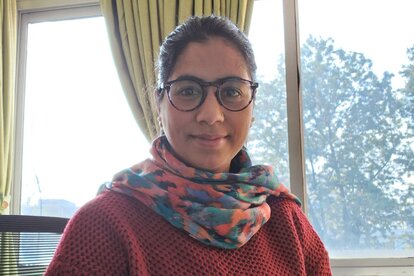Financial literacy classes provided by the Safer Migration (SaMi) Programme in Nepal have empowered the wives of migrant workers to manage finances, start businesses, and improve their families' financial stability. Local governments are increasingly involved in running these classes, and many women have benefited significantly. The program, a joint initiative by the Governments of Nepal and Switzerland with Helvetas Nepal's technical assistance, aims to enhance financial literacy and support sustainable development at the local level.
Basmati Chaudhary, 33, who owns a small tea shop in Munuwa bazar is thinking about expansion as her tea and snacks are loved by the locals. The knowledge about financial goals and business plans she gained through the financial literacy classes gave her the confidence to inject more investments into her business.
Janaki Municipality (Kailali) runs financial literacy classes as part of the Safer Migration (SaMi) Programme in Basmati’s village. These classes provide migrant households with information on increasing savings, maintaining records of income and expenses, family management, financial goal setting, accessing financial institutions, and developing business plans. Initially, Basmati was unsure how to spend the money remitted by her husband as she was under pressure to repay the loan. Learnings from the classes helped her navigate through the tough times and start an enterprise of her own. She now makes NPR 5,000 (approximately USD 37.61) daily, and her husband who works in Malaysia sends remittances regularly. She has invested the proceeds from both to her shop as well as daughter’s education. “I have learned to earn and live my dreams,” she said.
Basmati’s story is similar to many left-behind wives of migrant workers who manage entire households in their husband’s absence. Nepal heavily relies on remittance which is equivalent to nearly a quarter of the country’s Gross Domestic Product (World Bank, 2022). More than 56% of Nepali households depend on remittances sent by their migrant family members (Central Bureau of Statistics, 2011). With a steady increase in the number of migrant workers, the figure is expected to go up further. The baseline studies conducted by the SaMi program before the start of financial literacy classes suggest that many households with migrant workers lacked adequate knowledge to utilize their financial resources in better ways. They used their income to consume and pay loans while ignoring saving and investment. As a result, it was perpetuating the chain of migration. These baseline findings shed light on the prevailing financial circumstances and underscore the importance of interventions to improve financial inclusion and literacy among the surveyed population.
Sita Jaisi, 35, from Kohalpur Municipality (Banke) runs a tailoring shop. Her husband is in Qatar for foreign employment. His income alone was not sufficient to meet the expenses for their family of six. She joined the financial literacy classes and was motivated to start something of her own to support her husband. Sita already had tailoring skills. She decided to turn it into a business and took a loan from the local women’s group to buy machines. Soon her enterprise started yielding satisfactory income to support the family. She now saves up to NPR 15,000 (approximately USD 112.84) monthly.
Sita Jaisi, 35, from Kohalpur Municipality
Similar is the story of Somar Tamang, 47, whose wife is working in Kuwait. Since the recruitment agents demanded heavy fees for his labor migration, his wife volunteered to migrate to meet the household needs. He joined financial literacy classes run by Helambu Rural Municipality (Sindhupalchowk) where he understood the value of money remitted by his wife and also thought of making contributions from his side. Along with the responsibility of the youngest daughter, Somar started tunnel farming and planted a variety of seasonal vegetables. Since access to the nearby Melamchi market was easy, he has been able to make good earnings by selling his proceeds. Now, he is waiting for his wife to return so both can work together on their farm.
SaMi’s intervention in the financial literacy component started in 2014 as a pilot initiative to support migrants’ households to manage their remittances and families better and increase the financial returns of labor migration. Currently, in its third phase of intervention (2018–2024), the local governments are leading the operation of such classes by hiring financial literacy facilitators. Such classes consist of 21 sessions – 17 related to the financial aspect and four for group psychosocial counseling. The SaMi program, through its thematic partners, supports capacity building and supervision of the facilitators and psychosocial counselors and the development of training materials. The program also supports the government in identifying target areas and participants, conducting refresher training, monitoring, data collection, promoting cooperation with financial institutions, and coordinating with relevant stakeholders.
A total of 62,209 remittance-receiving families have completed financial literacy classes with financial and technical support from the program in its third phase. Among them, 98% are women. Home visits are conducted to enhance the learning experiences and provide additional support to the participants to address gaps in their understanding. After completing the 21-week sessions, five review classes are conducted monthly, focusing on entrepreneurial knowledge and skills. These follow-up sessions also facilitate establishing linkages to the available support services of the local governments.
The local governments are increasingly allocating budgets for financial literacy programs, indicating that they recognize the importance of financial literacy and its potential to improve the lives of the locals. Some local governments, including Ilam, Triveni, Rolpa, and Kapilvastu municipalities have appointed financial literacy facilitators with their own resources. Although the Local Government Operation Act 2017 mandates the local governments to provide financial literacy to the families of migrant workers at the local level, a clear structure for its implementation is not yet in place. The financial literacy facilitators, however, are closely coordinating with the social development section. Financial literacy is reflected in the municipal proceeding documents, policy, and plan, which suggests that it has become a priority for local governments and is being incorporated into their overall development strategies.
The local governments have started working with local cooperatives to promote financial literacy, which is a positive step towards creating a more coordinated and effective approach to financial education. As another milestone, the local governments are developing financial literacy strategies in line with Nepal Rastra Bank’s financial literacy framework to address the financial literacy needs of diverse groups at the local level. The SaMi program is currently providing technical support to 20 local governments in drafting such strategies, and eight of them have already endorsed it. These strategies are expected to guide and help in the sustainability of financial literacy programs at the local level.










